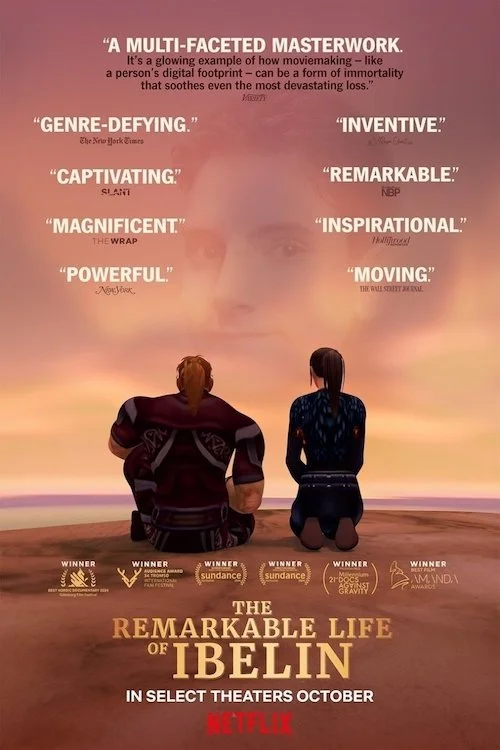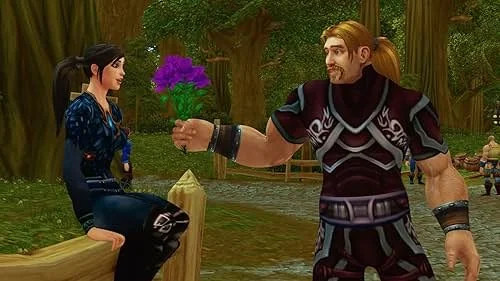The Remarkable Life of Ibelin
Written by Andreas Babiolakis
Video games are being considered the innovations, artistic and narrative benchmarks, and respected forms of entertainment that they always have been (mind you, they continue to grow in capability every year). However, that wasn’t always the case. I believe my generation was one of the earliest (save for maybe the Gen X folks before me) whose parents and teachers didn’t quite understand the fuss of video games and online culture when they were on the rise. How could I spend so many hours playing some nonsensical game? Wouldn’t my eyes become squares for playing too long? Granted, I used to have an addiction to video games as a child and teenager (one that led to anger issues, isolation, and other concerns), so perhaps I was too involved, but the middle ground was the right place to be. Video games shouldn’t be your everything, but they can definitely be your something. They are vessels of enjoyment, thought-provoking challenge, and storytelling prose in a way no other medium can accomplish. Additionally, they serve as escapism unlike any other. Films, series, and novels place you in new environments of others. Video games make you the star: either one crafted for you, or one you choose to be.
Mats Steen was a gamer, born the same year as me (1989) and with the same reservations surrounding the stigmas of video games hindering him and his peers. He also suffered from Duchenne muscular dystrophy for his entire life, and his condition only worsened as he got older, unfortunately passing at the young age of twenty five in 2014. It was 2024 when documentary filmmaker Benjamin Ree released The Remarkable Life of Ibelin at the Sundance Film Festival, and it was an instant success. Why did this documentary take ten years to make? That’s the magic of this film. Steen’s parents knew their son played video games for twelve hours a day: an alarming amount that prohibited him the time to accomplish anything else. They felt like he wasn’t making any friends or bettering himself in any way. Granted, twelve hours is a large time span that not even video-game-addicted me was fulfilling on a daily basis. Then again, Steen was confined to a wheelchair and unable to move most of his body. Video games brought Steen joy.
Besides that, The Remarkable Life of Ibelin is the discovery Steen’s parents made once he sadly passed: he had countless friends online in World of Warcraft: the cherished Blizzard game that become the highlight of many gamers’ lives (I’ve never played the game, strictly because I promised myself that I would never even touch the game when I was at my worst phase of video game addiction; it was my form of ensuring that I would slow down on the amount of hours I played; I have no personal opinion about the game as a result, but I do marvel at the in-game capabilities from what I have seen from others who have played it). In World of Warcraft, Steen is Ibelin Redmoore: a human rogue of the Starlight guild who impacted the lives of all the other members. Again, I’ve never played World of Warcraft, but I’ve played similar-enough games to know how incredible it feels to play as this avatar I’ve created, often forgetting that the character isn’t real nor are they the intended star of the game I am playing (the last couple of years saw me as a mystical, smooth-talking elf in Baldur’s Gate III named Amber; I was devastated once finishing the game, knowing I’d never play as them again, as if a part of me was forever gone).
The Remarkable Life of Ibelin is a touching look at grief and digital footprints.
In video games, you can be whoever you want to be. Steen chose to be Ibelin. In order to capture the power of an in-game avatar for those who don’t play video games, The Remarkable Life of Ibelin painstakingly recreated Steen’s time in World of Warcraft — with Blizzard’s help reanimating a bulk of pivotal moments he had while gaming (these animations are clearly not rushed, either, with proper voice acting, angles, and editing) — in a way that tells another half of his life. Meanwhile, his human self is shown through recovered home footage, detailing his slow degradation and succumbing to illness while Ibelin thrives. Eventually, both halves of his life collide, as his illness begins to take over his ability to play games, leading him to become frustrated with his peers. These include his best friends, and the crushes and relationships he had while gaming. What helps put all of his feelings in context is a blog he was keeping up to date for a good portion of the latter years of his life, particularly when he was getting sicker.
Altogether, The Remarkable Life of Ibelin creates a new look at grief, especially for those who learned how to connect with their son’s hobby after he departed. Here is a digital footprint made by someone who saw the value of escapism and the rewriting of one’s self online via multiplayer video games. Once Ibelin helps others with their problems online, you see the purest forms of connectivity via a method that is too frequently deemed anti-social or regressive. You see the capabilities present for those afflicted with disabilities; witnessing Steen thrive in his online community — and how affected by his passing the members of Starlight are — is impossible to not be moved by. Even seeing Blizzard recreating many moments (at least forty minutes of footage) so Steen can live again — this time now in cinematic form — whilst also honouring him with his own character ripped my heart to shreds.
Sure, not everyone understands video game culture in the same way millions of other honest hobbies are also misunderstood. However, everyone knows that grief is impossible to solve or tend to, especially right away. The Remarkable Life of Ibelin is a newer look at grieving in the digital age: a reminder that there is a whole new element to someone in the stories they were granted the ability to tell via video games. Steen’s parents wanted to be closer with him again after his passing, and they stumbled upon his Starlight community once an out pour of support came in. That was their first way of reconnecting with their son while grieving. Now, there’s The Remarkable Life of Ibelin: a film that consoles loved ones who continue to hurt, while introducing an adored spirit who had two lives, with each life being kept in the dark from the other. As for Steen, little did he know that he wasn’t just important as Ibelin: he was adored and crucial in real life as well. Regardless of your stance on gaming, The Remarkable Life of Ibelin will have you tearing up.
Andreas Babiolakis has a Masters degree in Film and Photography Preservation and Collections Management from Ryerson University, as well as a Bachelors degree in Cinema Studies from York University. His favourite times of year are the Criterion Collection flash sales and the annual Toronto International Film Festival.






